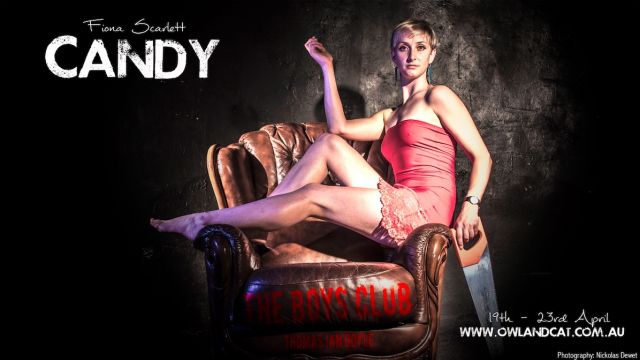The Boys’ Club
Time to party at a cement works. The boss, Gunner (Steven Psoras) gives the new guy, young Asher (Brayden Lewtas) six grand to take care of the ‘entertainment’: booze, drugs and a stripper. Gotta have a stripper. But things go wrong. Of course they do or there would be no play. Without adding any spoilers to the ensuing catastrophes, the drugs are bad shit and the boys get a little carried away with Candy the stripper (Fiona Scarlett). And when things go wrong, fear, panic, guilt and rage take over.
What is most disturbing about this play is that its characters are so recognisable. Young blokes who work hard and play hard, bursting with unused energy, dimly aware they are expendable, free-floating anger just under the surface, spoiling for a fight and happy to wipe ‘emselves out on booze or drugs; resentment verging on misogyny towards women and owing allegiance only to each other. It’s the great Australian ‘mateship’ gone rancid.

Thomas Ian Boyle delineates these traits well, aided by his talented cast of good looking men: Mr Lewtas, Tom Carty, Sergej Arcaba, Marcus Molyneux, Dominic Weintraub and Luke Mawley. The good looks, the health, the vigour of the boys make the spectacle of their desperation all the sadder. The female characters – Ms Scarlett, Mazz Ryan, Carolyn Dawes and Emily Nasr - are necessary, but in the main to illustrate how far loyalty will go and how far a woman will ‘stand by her man’. Among the cast the standouts are Marcus Molyneux as Tommy – exhibiting a cold, sullen but hard-headed realism – and Serjej Arcaba as Ox, a man whose essential decency is submerged under his anger at a broken marriage. (If Mr Arcaba does not move into film and television soon, I’ll be surprised.)
 While the text and performance stay focussed on masculine excess and the loyalty enforced when disaster strikes, The Boys’ Club is powerful – if somewhat repetitious - stuff. You might guess that the play is the fruit of much improvisation by the cast – with the risk of the pitfalls such a method involves. The signs are there: repetition, meandering dialogue, excessive use of the word ‘fuck’ and too much talking over each other.
While the text and performance stay focussed on masculine excess and the loyalty enforced when disaster strikes, The Boys’ Club is powerful – if somewhat repetitious - stuff. You might guess that the play is the fruit of much improvisation by the cast – with the risk of the pitfalls such a method involves. The signs are there: repetition, meandering dialogue, excessive use of the word ‘fuck’ and too much talking over each other.
But as the show continues (it runs 70 minutes) there’s a sense of Mr Boyle passing over some aspects of his situation - for instance, the role of Gunner, the boss, the older man, instigator and enabler, is underwritten – and having run out of inspiration. There are some interpolated scenes where one of the boys – in a horrific state himself – hallucinates a woman he wishes were alive. Here the show gets vaguely ‘poetic’ but stalls in its momentum. There’s an explicit sex scene between Tommy and Joyce (Ms Dawes) that seems rather gratuitous to me. The addition of one of the boys’ mother (Mazz Ryan) is not entirely clear in its intention- and should a playwright be adding characters late in the piece? The show regains its balance with an ‘after the funeral’ sequence, which is bizarre and chilling in its sentimentality.
This is an energetic and well-intentioned play that is maybe halfway there but still worth seeing. It may have been mounted prematurely; it may have launched on a wave of enthusiasm about its truth. It is ‘true’, but it veers off its truth and it could go deeper yet into that truth.
(A word of advice. The Owl and Cat [it used to be The Owl and the Pussycat] is a tiny venue. Take a seat in the front row or on the raised row at the back. Otherwise the sight lines are bad and you’ll miss a third of the action.)
Michael Brindley
Subscribe to our E-Newsletter, buy our latest print edition or find a Performing Arts book at Book Nook.

